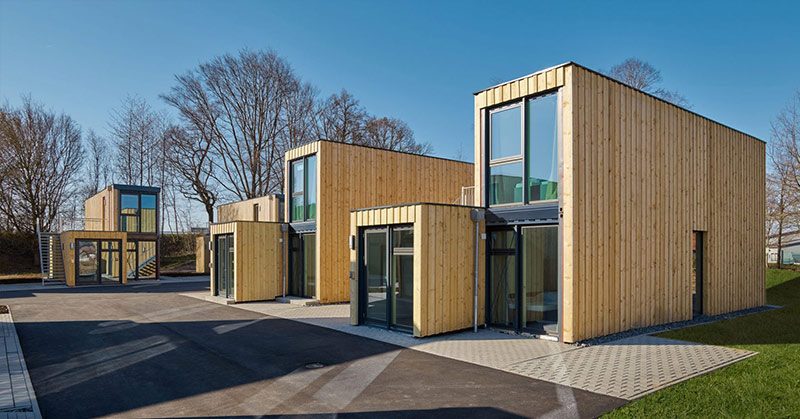For many years, travel, whether for business or pleasure, has often involved small, less-than-comfortable hotel rooms with dark, stuffy hallways. Over the last couple of decades, however, travelers have begun to demand better, and have looked for alternative places to stay while they’re away from home. Shipping container homes are one of those alternatives.
One company has seen the need for better travel accommodation and has stepped forward with an inventive solution.
Shipping Container Homes
Containerwerk is a building startup in Germany that has turned old shipping containers into 21 tiny apartments called My Home for visitors who are in town for business or leisure. Each apartment is made of three containers that have been arranged together and covered in timber [1].
Each of these small apartments feature 26 square meters of space, a kitchenette, a dining table, a bed, and a television. A separate container houses a bathroom and a shower. Floor-to-ceiling glazed windows bring plenty of light into the small space, and the white walls, wooden furniture, and grey upholstery brighten up the entire room.
The trendy containers were developed by Nicolas de Fejer along with his partners Felix von Knobelsdorff and Clemens Müller, with the goal of creating a sustainable alternative to hotels.
“We all travel a lot on business and are fed up with the dark, stuffy corridors and restrictive rooms typical of many hotels,” said Müller [1].
Von Knobelsdorff added that the entire project is sustainable, and the use of decommissioned freight containers is taking advantage of a valuable resource that would have otherwise been scrapped [1].
Read: Affordable Solar Homes Produce as Much Energy as They Use
The Demand for Eco-Friendly Travel
National Geographic conducted a survey of 3500 US adults that determined there is a strong support for sustainable travel. They found, however, that most of these people were not really familiar with what sustainable travel actually means.
“One of the reasons we embarked on this study was to have a better understanding of what consumers really want and what sorts of sustainability practices matter to them,” says Gary Knell, chairman of National Geographic Partners [2].
National Geographic Expeditions’ sustainability director, O’Shannon Burns, says that the best properties in the world are built with a mission to protect the people who live in that area, as well as the environment. Travelers who stay in places that directly support these communities have a better experience and come away wanting to do more to help [2].
Sustainable Stays
Most of us love traveling, but we know that it can have a negative impact on the planet. Because of this, many travel companies, airlines, and accommodations are taking steps toward becoming more sustainable and reducing their environmental impact.
Many hotels around the world are working to conserve energy and water by installing low-flow faucets, using more energy-efficient lightbulbs, and introducing linen resume programs to reduce washing.
Some hotels and resorts are also revamping their recycling programs to be more effective, and are switching their bathroom amenities, cleaning products, and even room keys to more environmentally-friendly alternatives [3].
The website ecobnb.com also contains a large database of sustainable accommodations around the world, and you can search tool to find an eco-friendly hotel or BnB wherever you are traveling to.
Keep Reading: Couple Build Amazing Shipping Container Home For Debt-Free Living

